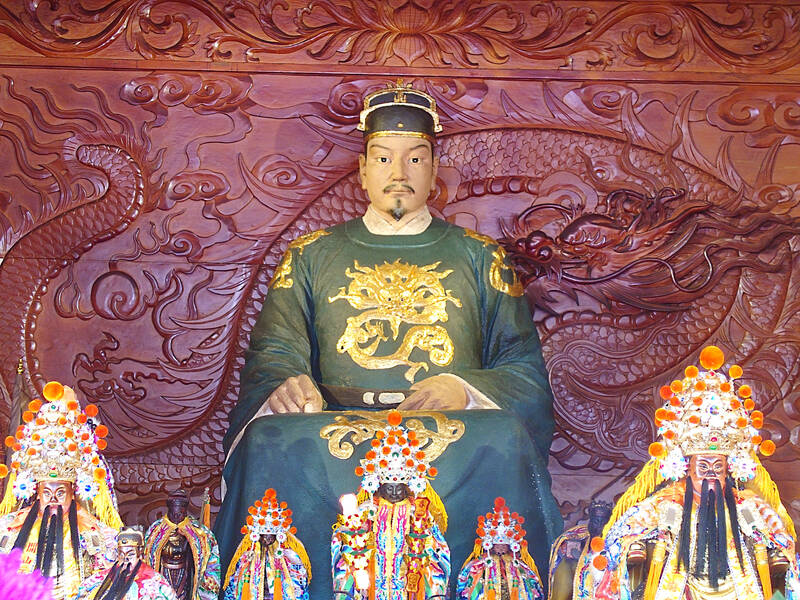Last week saw the appearance of another odious screed full of lies from the People’s Republic of China (PRC) Ambassador to Australia, Xiao Qian (肖千), in the Financial Review, a major Australian paper. Xiao’s piece was presented without challenge or caveat. His “Seven truths on why Taiwan always will be China’s” presented a “greatest hits” of the litany of PRC falsehoods.
This includes: Taiwan’s indigenous peoples were descended from the people of China 30,000 years ago; a “Chinese” imperial government administrated Taiwan in the 14th century; Koxinga, also known as Cheng Cheng-kung (鄭成功), “recovered” Taiwan for China; the Qing owned it as China; the Cairo Declaration; Taiwan was legally returned to China after World War II and UN Resolution 2758. These lies have all been refuted countless times.
CHINESE PROPAGANDA

Photo: Hung Jui-chin, Taipei Times
One of the key elements of getting propaganda accepted is repetition. The size of the lie is irrelevant, if it is constantly in front of the people you want to hear it. All marketers know that — repetition is the reason most of us can still sing advertising jingles from our childhood. The “marketplace of ideas,” a notion defined by the quaint fantasy that people are rational, yields always to repetition, and always to outrageous lies.
As anyone who has ever attempted to deal with nonsense knows, refuting lies demands far greater effort than uttering them. Knowing this, PRC representatives are engaging in a broad front campaign on Taiwan’s status that is slowly poisoning academic and journalistic discourse like salt water leaching into a freshwater aquifer.
This is why the international media must stop platforming official speakers from the PRC. The PRC already has a broad array of state media organs to further its propaganda. There is no need for major international media to volunteer its own space, especially unchallenged. Nor does the PRC reciprocate. How can there be a “marketplace” of ideas involving the PRC when one-half of the space is tightly controlled and closed to outside speakers, and presents a smooth and invarying face to outsiders?

Photo: AFP
Another issue with this alleged “marketplace” is that the narratives about Taiwan from the PRC are state-sponsored, while the people who respond to them in the democracies generally do so as individuals. This reduces their voice, and their impact.
This official-private asymmetry extends across this discourse. Official claims by the PRC are attended by a cloud of sycophants, trolls and shills who stage flurries of individual assaults on anyone who dares challenge the official line, like a cloud of wasps defending a hive. Incredible, debilitating effort must be expended merely to maintain one’s voice against this onslaught.
That is why, now more than ever, incoming US State Department officials must begin constantly speaking on the status and history of Taiwan. It needs to become a habit. US officials must stop hiding behind the word salad that has been used for the last 50 years, that opaque verbiage about assurances and communiques that simply enables PRC abuses of the truth. They are just ceding the discourse space to Beijing.

Photo courtesy of the Pingtung County Government
The US must establish its own counternarrative. Without the backing of official Washington, responses to PRC lies by individuals are merely an elaborate form of virtue signaling.
A US counternarrative does not exist merely to refute and should not be done in response to PRC speakers. When the PRC is refuted, it goes right on speaking, still occupying the space. The purpose of a State Department counternarrative is to re-occupy the discourse space it has ceded to the PRC. That means that whenever Taiwan comes up in the discourse (not just when PRC officials have spoken), US officials need to forward the US narrative.
SHAPING A COUNTERNARRATIVE
How should this narrative be shaped? First, since PRC claims to Taiwan are situated against its fake historical narratives about Taiwan and Chinese history, US officials must always state that the current US policy is that Taiwan is not part of China, instead of hiding that policy.
However, because China legitimates its claims by attributing them to history, US officials should go further in building their counternarrative. They should also state that Taiwan has historically never been part of any Chinese emperor’s domain and depict PRC claims as they truly are: false histories of recent invention.
Identifying PRC claims as false does not mean shifting the US position on Taiwan and contending it should be independent. It simply means constantly pointing out that the PRC is an imperialist state engaged in territorial expansion and aggression, not recovery of lost territories.
At present, by not forthrightly saying that, the US makes the PRC appear reasonable, even the victim, in its claims, when it could be routinely making the PRC seem shrill, aggressive, whiny and mendacious.
The PRC also makes its demand for Taiwan seem reasonable by speaking of it in isolation from its other expansionist moves, except for occasional linkages to its claim to the Japanese-controlled Diaoyutai Islands (釣魚台列嶼), also known as the Senkaku Islands in Japanese. US officials should constantly remind international audiences that its desire for Taiwan is merely part of a larger wave of expansion that includes Bhutan, Nepal and much Indian territory, along with the better-known grab of the South China Sea, Tibet and East Turkestan (Xinjiang). The PRC has even invented a bogus term, “core interest,” to help isolate Taiwan from its other land grabs by assigning it a seemingly unique emotional importance.
SELF DETERMINATION
Another rhetorical move the US should make is that whenever Taiwan is mentioned, US officials should point out that various UN declarations and other international agreements support self-determination for the people of Taiwan. They should also observe that this position was widely held by Chinese elites across the political spectrum in the 1930s.
This would undercut the PRC’s “historical” claim, showing its recent appearance, and highlight that the right of the Taiwanese to live in a free and democratic society has been historically recognized by Chinese actors. The US doesn’t have to openly support Taiwan independence, but it should, in the spirit of its own history, support the right of the Taiwanese to choose their future.
Finally, the international media is unlikely to stop giving space to officials from the PRC to spout nonsense, simply because so many of the people making editorial decisions are benefiting from PRC money and connections. But the US supplying PRC opponents with a ready-made, globally-available narrative would help tremendously in not only countering PRC discourse, but in establishing the moral and political case for US-led intervention when the PRC moves on Taiwan.
Notes from Central Taiwan is a column written by long-term resident Michael Turton, who provides incisive commentary informed by three decades of living in and writing about his adoptive country. The views expressed here are his own.

For many centuries from the medieval to the early modern era, the island port of Hirado on the northwestern tip of Kyushu in Japan was the epicenter of piracy in East Asia. From bases in Hirado the notorious wokou (倭寇) terrorized Korea and China. They raided coastal towns, carrying off people into slavery and looting everything from grain to porcelain to bells in Buddhist temples. Kyushu itself operated a thriving trade with China in sulfur, a necessary ingredient of the gunpowder that powered militaries from Europe to Japan. Over time Hirado developed into a full service stop for pirates. Booty could

Politically charged thriller One Battle After Another won six prizes, including best picture, at the British Academy Film Awards on Sunday, building momentum ahead of Hollywood’s Academy Awards next month. Blues-steeped vampire epic Sinners and gothic horror story Frankenstein won three awards each, while Shakespearean family tragedy Hamnet won two including best British film. One Battle After Another, Paul Thomas Anderson’s explosive film about a group of revolutionaries in chaotic conflict with the state, won awards for directing, adapted screenplay, cinematography and editing, as well as for Sean Penn’s supporting performance as an obsessed military officer. “This is very overwhelming and wonderful,” Anderson

Jacques Poissant’s suffering stopped the day he asked his daughter if it would be “cowardly to ask to be helped to die.” The retired Canadian insurance adviser was 93, and “was wasting away” after a long battle with prostate cancer. “He no longer had any zest for life,” Josee Poissant said. Last year her mother made the same choice at 96 when she realized she would not be getting out of hospital. She died surrounded by her children and their partners listening to the music she loved. “She was at peace. She sang until she went to sleep.” Josee Poissant remembers it as a beautiful

Another moment of the US making permanent concessions for transient gains, which appears to be longstanding US policy with the People’s Republic of China (PRC), occurred last week when President Donald Trump announced that weapons sales to Taiwan would be delayed in order to arrange a meeting with the PRC dictator Xi Jinping (習近平). There were “concerns among some in the Trump administration that greenlighting the weapons deal would derail Trump’s coming visit to Beijing, according to US officials,” the Wall Street Journal reported. It attributed the suspension of the weapons sale to pressure from Xi. While some might shrug